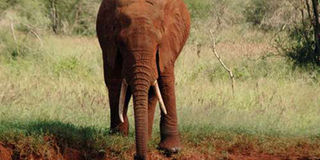At Leva Camp, humans and wild animals mingle freely

An elephant drinks water from a pond inside Tsavo West National Park. Leva Camp neighbours the famous game park. PHOTO | FILE | NATION MEDIA GROUP
What you need to know:
Established in 2005 as an income generation venture by a group of 120 area residents, Leva Camp has carved itself an unrivalled niche in offering hospitality in the wild.
Leva Camp exposes visitors to zebras, elephants, rhinos gazelles, monkeys and an assortment of birds.
Away from the anticipated thrill in residing next to wild animals, Leva Camp gives visitors a perfect, quiet hideaway from the hustle and bustle of urban life.
Anywhere in Makueni County, residents fret about elephants, thanks to incessant jumbos attacks targeting them
But in Leva Camp in Matangini Village, three kilometres from Mtito Andei Town, on the fringes of Tsavo West National Park, humans mingle freely with the wild animals.
“Actually, here wild animals get out of their habitats and approach humans,” says Mr Leva Wambua, 60, a reformed poacher who donated a plot where a community group set up the camp.
Established in 2005 as an income generation venture by a group of 120 area residents, Leva Camp has carved itself an unrivalled niche in offering hospitality in the wild.
Away from the six tented camps dotting the five acres dedicated for this project, Leva Camp exposes visitors to zebras, elephants, rhinos gazelles, monkeys and an assortment of birds.
“However, this facility only suits the adventurous campers who are brave enough to mingle with wild animals,” says Mr Wambua when I visited the facility over the weekend.
According to Mr Wambua, not many people would endure the sound of an elephant’s rumbling tummy as the animal paces around the tarpaulin camps while snacking on nearby vegetation after drinking from a watering hole that is ten metres from one of the camps.
PERFECT HIDEAWAY
Away from the anticipated thrill in residing next to wild animals, Leva Camp gives visitors a perfect, quiet hideaway from the hustle and bustle of urban life.
Visitors make their own meals at the site and have an option of going for shopping at Mtito Andei Town or borrowing items from the villagers residing a kilometre away.
The story on the origin of Leva Camp is equally tantalising. Until 1992, Mr Wambua and five of his neighbours roamed national parks, hunting down wild animals, mostly gazelles, elephants and rhinos, for meat, tusks and horns.
“We would pitch camp in Tsavo East, Tsavo West and Ithumba game parks and emerge with horns and tusks when lucky,” he says.
However, things did not always work for them and in other cases their relationships almost snapped like it finally did in August 1992 at Ithumba National Park in Kitui County.
“A colleague almost released a poisoned arrow on me after we quarrelled on how to share meat from an animal we had mowed down,” says Wambua pensively.
Dejected, Mr Wambua broke ways with the hunter group and, risking being spotted by authorities, walked out of the forested park in broad daylight.
He never went back to poaching again. Instead he took up farming.





